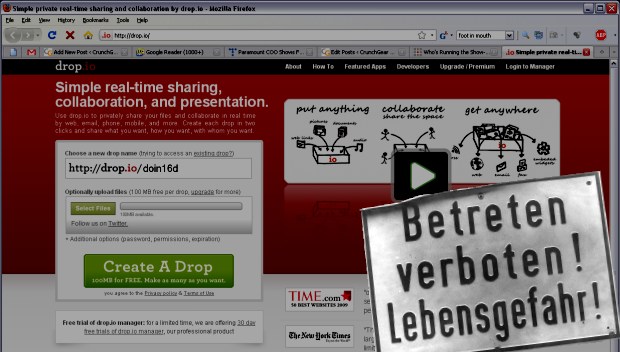
In what was ostensibly a meeting of the majors last week to advise the FCC on broadband policy, the COO of Paramount was allowed to wax ignorant for 10 minutes on piracy and file-sharing technology. As a major content provider, they should certainly have some input, but this was sheer soap-boxery. Sure, peer to peer and torrent traffic (legal and otherwise) is going to be a major driver of broadband adoption and major consumer of the resource, but Paramount’s contribution to the discussion didn’t limit itself to germane observation and reasonable speculation.
On the upside, we have a fabulous new quote on the level of Ted Stevens’ “series of tubes” that demonstrates how utterly out of touch people like Paramount’s COO are with actual Internet terminology and capabilities. Behold:
“We are uploading it essentially to a ‘cyber locker,’ which is nothing more than electronic locker on the Internet.”
Mr. Huntsberry, we are in your debt for this immortal chestnut of cyber-wisdom. That’s nothing more than electronic wisdom on the Internet, for those of you who don’t know.
Here is his presentation. It has an air of Reefer Madness to it.
It’s an excellent study in how the RIAA and MPAA are able to show a service solely in the light of illegality. I like to imagine them showing a picture of a hammer. “This is what’s called a hammer, it’s essentially a heavy rock on the end of a stick. This allows the user to beat people with said rock over and over without losing it. The stick portion can also be used to dig up other people’s gardens.” As far as they are concerned, there is no legitimate application for a site like Mininova or, incredibly, something as simple and practical as Drop.io.
Interesting that he’d look at something like Drop.io and not Megaupload or another such widely-misused site. Note that the free accounts at Drop.io are limited to 100MB. Frederick, if I may:
![]()
Clearly Drop.io is not at the cutting edge of piracy, however useful it may be for sharing home videos and other medium-sized files.
It’d all be the usual fun and games if this weren’t a public hearing, advising the FCC on broadband policy. It was neither the time nor the place for copyright issue grandstanding. As if that weren’t bad enough, Paramount decided that its own portion of the hearing, a public policy meeting you understand, would be private. Its explanation for asking for this was that the content of the presentation was unpalatable for public consumption. And, disappointingly, the FCC agreed to this ludicrous condition.
Luckily, the concerned citizens at Public Knowledge found a copy of the presentation and put it up on YouTube. They had to snip it from the FCC’s Real Video stream (!) and I’m sure they’re fielding takedown notices as I type this.
There’s a fairly obvious conflict of interest going on here, among other things. Public Knowledge has an excellent breakdown of the issues involved, and Techdirt has a nice follow-up as well, so I’d rather not duplicate their content here, even if I were capable and informed enough to do so.
I have to say, though, the bubble Huntsberry speaks from is pretty entertaining. “This is a site that is clearly an illegal website” indeed. I understand you have to speak for your company’s best interest, but you might want to take your foot out of your mouth first.
[Update: Title changed to have more Ps in it.]